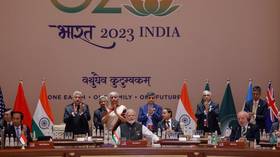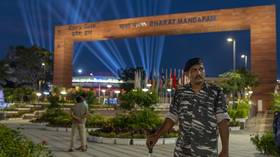India’s G20 presidency has ‘walked the talk’ – finance minister
The Delhi Declaration was adopted by the leaders of the world’s largest economies on Saturday after days of tough negotiations
The Indian presidency in the Group of Twenty (G20) has successfully accomplished the diplomatically complex mission of reaching a consensus between the fractured grouping of the world’s most influential economies over the wording of the G20 leader’s joint communique.
Briefing the media after the Delhi Declaration was adopted on the first day of the summit, officials underscored the role of India’s negotiators in achieving a 100% consensus over 83 paragraphs of the final communique.
Indian finance minister Nirmala Sitharaman said that India’s G20 presidency has “walked the talk” in drawing up an 83-paragraph G20 Delhi Leaders’ Declaration, adopted on Saturday a day ahead of schedule at the behest of Prime Minister Narendra Modi.
The Indian presidency managed to draft a resolution that was “shared by all members” as it carefully assimilated all the perspectives of the members and recognized the differences, the minister said, adding that New Delhi worked to ensure that geopolitical tensions and differences do not overshadow the key agenda.
Pointing out one of the key outcomes of India’s presidency, Sitharaman stated the grouping has committed to reforms for better, bigger, and more effective MDBs to address global challenges to maximize developmental impact. “India has harnessed the G20 presidency to effectively articulate concerns of the Global South on multilateral development banks (MDBs),” she asserted.
“The Indian presidency has been exceptional,” India’s Foreign Minister Dr. Subrahmanyam Jaishankar stated. When queried about the declaration’s language on the Ukraine conflict, he mentioned that eight paragraphs had been devoted to the topic – a significant step forward from last year’s Bali declaration.
Jaishankar brushed off the questions about the lack of reference to Russia’s “aggression”, something that the Bali Declaration mentions, saying: “Bali is Bali and New Delhi is New Delhi”. “Frankly, the world has changed in the past year, and the Delhi declaration reflects that,” the minister noted.
India’s G20 Sherpa Amitabh Kant attributed the success of his country’s presidency in arriving at a 100% consensus to the Prime Minister’s drive and enthusiasm. The Delhi Declaration had a “huge Indian footprint,” he added.
Although Jaishankar said that every member helped create the consensus and overcome the differences on Ukraine, Kant divulged that it was the emerging markets that played the pivotal role: Indonesia (last year’s G20 president), India, Brazil (next year’s G20 president) and South Africa (to be G20 president the year after Brazil), played the key role in resolving the matter. “Also, there was great teamwork by our officials,” Kant said, singling out the role of Ministry of External Affairs Joint Secretaries K. Nagaraj Naidu and Eenam Gambhir.
Jaishankar pointed out that talks to work out the difficulties and arrive at a joint communique started earlier this week during the ASEAN summit in Jakarta, where PM Modi has met several leaders. Responding to a question on the absence of Chinese President Xi Jinping from the G20 summit, Jaishankar stated, “I don’t think one should overly read meanings into it. What I think is important is what is the position that country has taken, and how much that country has contributed to the deliberations and the outcomes”. China was very supportive of the various outcomes, the foreign minister affirmed.
You can share this story on social media:









Comments are closed.